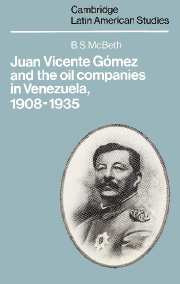Book contents
- Frontmatter
- Contents
- List of tables and map
- Preface
- List of abbreviations
- Introduction
- 1 The dawning of an era
- 2 The legal framework
- 3 Oil companies and finance
- 4 National and local effects of the oil industry
- 5 Greater control of the oil industry
- Conclusion
- Appendix
- Notes
- Bibliography
- Index
- CAMBRIDGE LATIN AMERICAN STUDIES
3 - Oil companies and finance
Published online by Cambridge University Press: 22 September 2009
- Frontmatter
- Contents
- List of tables and map
- Preface
- List of abbreviations
- Introduction
- 1 The dawning of an era
- 2 The legal framework
- 3 Oil companies and finance
- 4 National and local effects of the oil industry
- 5 Greater control of the oil industry
- Conclusion
- Appendix
- Notes
- Bibliography
- Index
- CAMBRIDGE LATIN AMERICAN STUDIES
Summary
The 1922 Oil Law created the right legal conditions for the oil companies, and from that year onwards Venezuela was to experience an unprecedented increase in oil production, rising from 6,000 barrels per day in 1922 to 425,000 barrels per day in 1936. By 1928 Venezuela had become the second largest oil producer, and the leading oil exporter, in the world, accounting for 8 per cent of total world oil production. Although Venezuelan oil production was dominated by Shell up to 1934, two American companies, Exxon and Gulf Oil, started in 1925 to make inroads into this dominance, and by 1928 had surpassed Shell, controlling 60 per cent of the total production at Gómez's death in December 1935. These three companies accounted for 99 per cent of the total production during Gómez's regime.
Although these three companies dominated the industry, over 120 other companies entered the country to acquire and deal in oil concessions. This large influx of companies, which Torres sought to avoid in order to reduce speculation in the country's natural resources, allowed a large number of people to transfer their oil concessions. As a result, during Gómez's lifetime, the companies acquired 2,434 oil concessions (50 per cent of the total 4,875 concessions awarded to individuals), which had been held by 829 concessionaires (54 per cent of the total number of concessionaires).
- Type
- Chapter
- Information
- Publisher: Cambridge University PressPrint publication year: 1983



